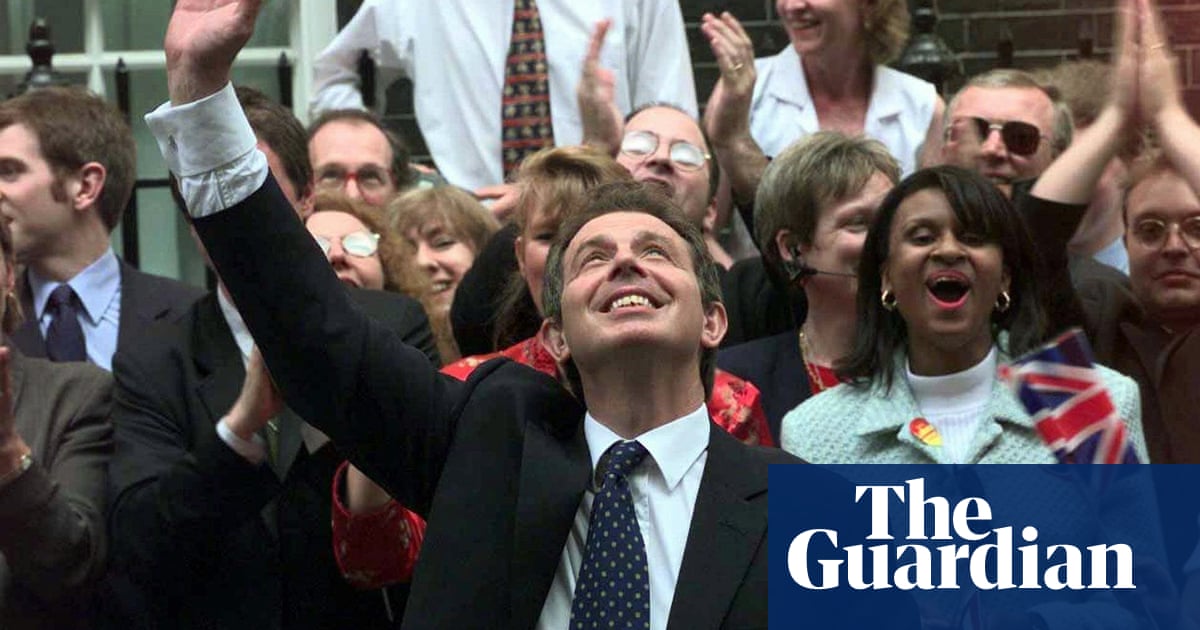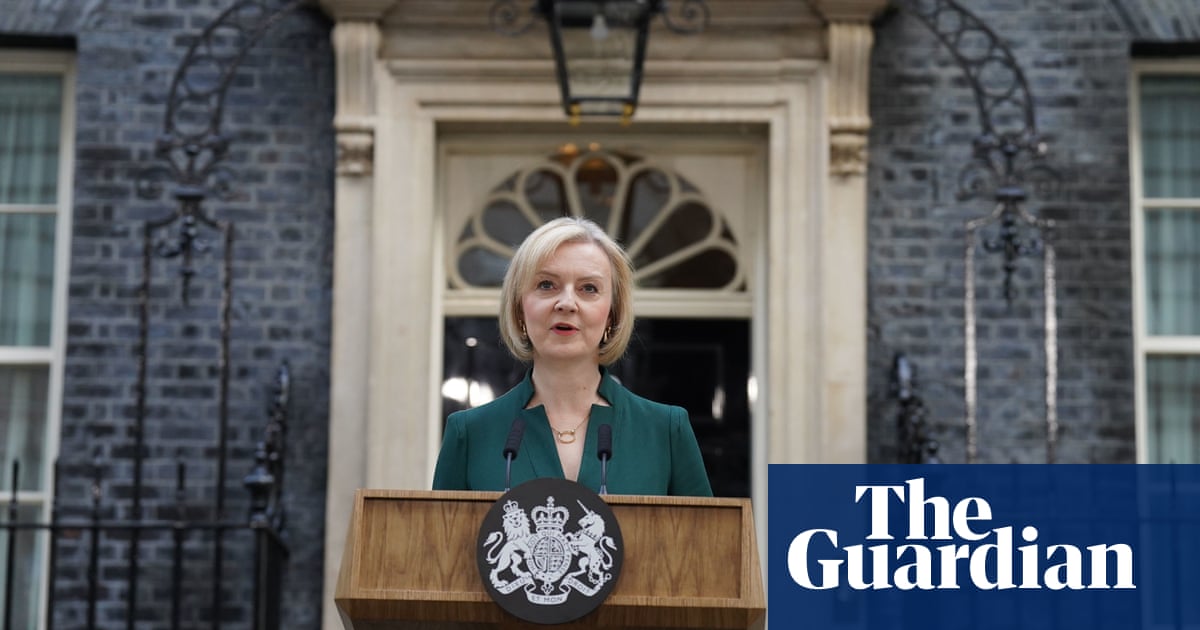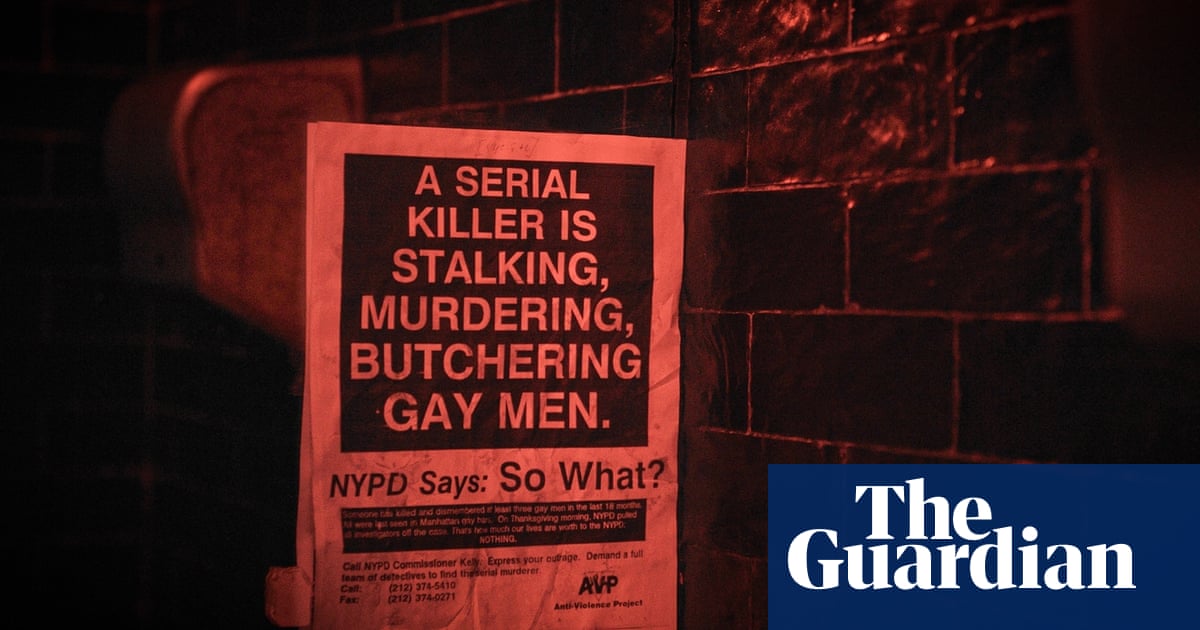
As voters headed to the polls on the morning of 1 May 1997, Tony Blair turned to his old friend Charlie Falconer and asked an unexpected question.
“On the day of the election itself he asked me if he thought he’d get back to the bar – and he didn’t mean the licensed bar, he meant the legal bar,” Falconer recalls 27 years later. Unconvinced by predictions of the Labour landslide to come, the party leader wanted to know whether he might be able to return to his old career as a barrister.
“I don’t think anybody felt … certainly not on the day of the election itself, that we’re going to lose – except for Tony, who just couldn’t believe what was about to happen.”
Falconer was speaking to the Guardian as part of an in-depth look back at 1996, focusing on what Labour did in the year before its landslide victory and asking whether today’s Labour party can replicate that success. A two-part Guardian Today in Focus podcast series will be broadcast next Monday and Tuesday.
Key figures from the time tell a tale of paranoia, frenetic activity, frequent infighting and, finally, overwhelming relief, as one of the most pivotal years in British politics played out.
Several also said that Keir Starmer, the current Labour leader, risked learning the wrong lessons from 1997 by being too cautious, arguing that Blair was more radical in his policy approach than many remember.
David Miliband, Blair’s head of policy at the time, says: “We were having to reinforce our commitment to the electorate that we wouldn’t be a risk for them, but we were also having to give them a sense of hope and change. In that sense, we needed to be radical as well as credible.”
Reassurance, reassurance, reassurance
By early 1996, Blair had been Labour leader for 18 months. During that time he had stamped his authority over the party, most notably by forcing through changes to clause IV of the party’s constitution to remove references to nationalisation.
Blair’s shift away from traditional socialism had paid dividends. The party was 26 points ahead in the polls, while Blair himself had an approval rating of plus-22.
But still voters were unsure. In 1995 the American pollster Stan Greenberg wrote a memo warning: “‘Change’ voters are turning to Labour, not because of Labour, but because of their disaffection with the Tories. Our main task is to make sure that this is as easy a choice as possible.”
So the party entered 1996 with a mantra: “reassurance, reassurance, reassurance”. Blair and Brown agreed they must constantly reassure the public that this was not old Labour; they did not intend to raise taxes and public spending once in office.
The approach mirrors that being taken today by Starmer, who has spent much of 2023 changing or junking potentially controversial policies, from delaying the £28bn green prosperity fund to overturning the promise to end university tuition fees.
Those who were around in 1996, however, say there were two main differences between then and now.
First, Blair’s project was the culmination of more than two decades of work. His two immediate predecessors, Neil Kinnock and John Smith, had done much of the policy formation that Blair enacted once in government, including the pledge to introduce a minimum wage and the promise to cut class sizes in primary schools to below 30.
Liam Byrne, who helped Labour reorganise its headquarters in 1996 and is now a Labour MP, says: “Starmer is trying to do in five years what Neil Kinnock, John Smith, Tony Blair did over many years.”
Second, Blair was heading into an election after a period of sustained growth: the economy had not shrunk in a single quarter for nearly five years. That allowed him to promise to keep taxes low while still being able to spend the proceeds of growth. By contrast, Britain is still recovering from the Covid pandemic, and the economy shrank by 0.5% in July amid strikes and poor weather.
Falconer says: “In 1996/1997 the economy wasn’t the issue. Today, though, you have got to have some convincing explanation about what you’re going to do differently to the economy from the Conservative party.”
The manifesto takes shape
While Blair embarked on his year reassuring the British public, many of those around him engaged in a period of rapid policy formation as they honed what would become the 1997 manifesto.
Miliband says: “Tony gave me a very clear instruction when he hired me in June 1994. He said: ‘Look, you’ve got to get rid of the policies that are going to lose us votes.’ He called that ‘bomb disposal’.”
Bomb disposal was not always easy. Arguments were common and Blair and Gordon Brown, the shadow chancellor, frequently clashed over the policy detail.
Brown wanted to create a Scottish parliament, Blair was adamant there should be a referendum first. Blair wanted a clear commitment to join the euro, Brown wanted to make sure it was tied down with preconditions. They even fought over how many pledges there should be on the pledge card, with Brown arguing five would be too limiting.
Peter Mandelson, who was campaign coordinator, says: “They would be up all night, they were hammering away, drilling down. I don’t think anyone in politics these days has any real sense of how hard everything was … People in politics today sometimes feel it all looked so simple in Blair’s day. But it wasn’t.”
Alastair Campbell, Blair’s press secretary, adds: “Going through my diaries, it’s a form of PTSD reliving all the different rows that we had, most of which, thank God, I’d forgotten. It wasn’t deliberate, creating conflict, but the conflict just seemed to spill out there.”
At that point, however, there was little of the personal animosity that was later to poison the relationship between Brown and Blair.
Harriet Harman, who was shadow social security secretary at the time, says: “If you were ever in a room with Tony, you would always be interrupted by: ‘Oh, I’ve got Gordon calling.’ And then if you’re having a meeting with Gordon, you’d always be interrupted by Gordon saying: ‘I’m going to ring Tony and see what he thinks about that.’”
The stormy policy debates also had a purpose. Those around Blair knew that they had to have something positive to say to voters when it came to the election; simply not being the Tories would not be enough.
Campbell sums it up as “reassurance alongside the promise of radical change”.
They also believed that if they won, it would be with a small majority, and they would need to legislate quickly before losing a grip on the political agenda.
“If we were ever to win this election, we had to be so out of the traps at speed and be able to govern,” says Falconer. “The best we could hope for probably was some wafer-thin victory, and so what was going to happen when we won was absolutely vital.”
Education, education, education
Labour members gathered in Blackpool in late September 1996 for the party’s last conference before the election. England had hosted the Euros that summer; the Spice Girls were conquering the US; Oasis and Blur were making British rock relevant again. The country was in an optimistic mood, and so was the party.
Members knew that for the first time in years, what happened at Labour conference was of national, and even international, significance. Those attending included representatives from Israel and the Palestinian territories.
Falconer says: “It was absolutely electrifying. By the time we get to 1996, the world is absolutely focused on Labour. Everybody assumes – except Tony Blair – that we’re going to win the election. Foreign dignitaries are coming to kiss his ring at that particular point.”
Blair and his aides, however, were desperate not to look triumphalist. “There was an absolute horror and fear of looking like we were arrogant and that we thought we’d already won the election,” says Harman. “There was a load of mythology around the Sheffield rally ahead of 92 [when Labour threw what looked like a victory rally ahead of the actual election, before going on to lose].”
They need not have worried. Blair’s speech, with its soundbites of “Labour’s coming home” and “education, education, education” were rapturously received in the hall and elsewhere, and the party received a modest bump in the polls afterwards.
It was time for the final push.
The Sun backs Blair
The 1997 election got off to the perfect start for Blair.
At 11.30am on 17 March, John Major went to Buckingham Palace to ask the Queen to dissolve parliament before the election. Hours later, on the other side of London, the Sun’s printing presses cranked into action emblazoned with a now famous headline: The Sun Backs Blair.
Blair and his aides were delighted. They had been working for years to secure the backing of the Murdoch press, including a controversial visit to the media mogul in Australia in 1995.
Campbell admits: “I didn’t feel terribly comfortable about some of the things we had to do to keep the Murdoch press broadly on board. But I remember Tony saying that if you’ve got a dog in the corner, and you’re worried it might have rabies, you want to keep it in the corner.”
The Sun’s front page set the tone for much of the campaign to come. Everywhere Labour campaigners went, they were greeted with euphoria.
“It was absolutely phenomenal,” says Harman. “All you had to do is put on a Labour rosette, get off a train at some station at what was regarded as a marginal seat, and people would come up to you in the street and say: ‘We’re voting for Tony Blair.’”
The Labour campaign went so well, in fact, that officials even had time to invent significant new policy announcements in the middle of it.
“Suddenly we realised we had space on the grid,” says Miliband. “What’s more, the proceeds of the millennium lottery had not been allocated. So we suddenly thought, right, what are we going to spend this on?”
Miliband’s answer was to create a new body called the National Endowment for Science, Technology and the Arts. Nesta, as it is now known, still exists 27 years later as an innovation-focused thinktank – one of the Blair government’s legacies.
Nevertheless, nobody foresaw the scale of the victory to come. Harman recalled flying down to campaign for Candy Atherton, a Labour candidate in Cornwall, along with several other MPs.
“We sat on the plane and suddenly there was terrible turbulence and we were tossed around,” she says. “There were about 12 Labour MPs on it. We were like, God, this was not such a good idea. If this plane goes down, we could lose our majority.”
A new dawn
To the relief of Labour officials, 1 May 1997 began with warm and dry weather: ideal for maximising turnout. However, the queues that built outside polling stations during the day indicated something bigger was happening.
“People were out in droves queueing to vote,” says Harman. “One person came rushing up to me and said: ‘How do I vote for Tony Blair?’ And I said: ‘Well, actually, you vote for Tony Blair by putting your cross against Harriet Harman.’”
Blair himself was holed up in Myrobella, his large constituency home outside Sedgefield, for much of the day. Campbell, who had stayed the previous night, remembers realising that morning they were on the brink of something historic.
“John Burton, Tony’s constituency agent, arrived, and he came in and turned the radio on, and it was tuned to Radio 4 – the Today programme,” Campbell says. “I said: ‘God, John, I can’t listen to this stuff any more.’ I started twiddling the knobs to try to find the music station. And I found that local music station, and they were playing Abba, Winner Takes It All. And I turned to John and said: ‘I think we’ve won.’”
Nothing was clear, however, until 10pm, when the BBC broadcast the results of its exit poll. “Tony Blair is to be prime minister and a landslide is likely,” David Dimbleby told the nation.
As the results began to come in, party officials were astonished by the seats they were winning.
Mandelson, having won his seat of Hartlepool, flew down to London with the writer Robert Harris in a small aeroplane hired by the Sunday Times, for whom Harris was writing a feature. The plane flew low enough for the pair to pick up Radio 4 so they could listen to the results coming in.
“As we flew down the spine of England, we had seats dropping like nine pins into Labour’s lap on our left and our right,” he says. “We were in the east Midlands, we were in the West Midlands, we were going down towards the home counties, we went to north London. It was unbelievable the number of seats [we won], many of which had never featured on any target list I had been playing around with.”
Even as it became clear they had won a landslide victory, however, party aides were still sweating over the details. Blair was due to open a speech at the Royal Festival Hall in the morning with the line: “A new dawn has broken.” But what if the weather was bad and no one could see the dawn breaking?
“Just as we got to the Festival Hall, the sun comes out,” says Miliband. “It was amazing – pretty special.”
Lessons for Starmer
Nobody involved in today’s Labour party expects a repeat of 1997’s scenes.
Starmer believes the public has grown tired of politicians with grand visions, and would rather elect someone managerial who can reduce the drama in British politics. And he acknowledges the economic backdrop to this election means that much of what the party did in 1997 is no longer possible.
“The mood in 97 was one of optimism,” he told the BBC’s Nick Robinson last week. “The economy was growing, our services, public services weren’t on their knees and we were turning into a new century, which always gives this sort of human sense of hope.
“It chimed with the times, but it wouldn’t now. And it’s a big mistake to misread the mood of the country at the moment.”
Many of those close to Blair, however, believe Starmer is in danger of offering Blair’s reassurance but without the radical policy platform that came with it. Some argue today’s economic insecurity is a reason to be bolder with policy proposals, not more timid.
Miliband says: “You have to reboot the economic, social and political bargain, which is really the challenge that the country faces now.”
Campbell says: “Starmer has done an amazing job to get from where Labour were in 2019 – where the argument was: can Labour ever win again? – to the argument now being: How can Labour lose this?’
“But at the same time, I sometimes worry that along with the paranoia that we had, we also had alongside it an absolute determination to be making the weather all the time.”
He adds: “A defensive crouch is fine as a defensive crouch to pull the pins out of the hand grenades, to make sure the campaign is run on your terms. But then it’s: Right, what are those terms, what are those things you want to drive your campaign? And that’s the bit I think Labour need to do more on, not less.”












